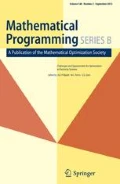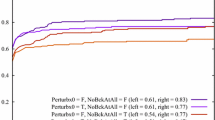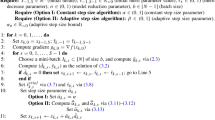Abstract
The sequential quadratic programming method developed by Wilson, Han and Powell may fail if the quadratic programming subproblems become infeasible, or if the associated sequence of search directions is unbounded. This paper considers techniques which circumvent these difficulties by modifying the structure of the constraint region in the quadratic programming subproblems. Furthermore, questions concerning the occurrence of an unbounded sequence of multipliers and problem feasibility are also addressed.
Similar content being viewed by others
References
M.C. Biggs, “Constrained minimization using recursive equality quadratic programming,” in: F.A. Lootsma, ed.,Numerical Methods for Non-linear Optimization (Academic Press, London, New York, 1972) pp. 411–428.
J.V. Burke, “Descent methods for composite nondifferentiable optimization problems,”Mathematical Programming 33 (1985) 260–279.
J.V. Burke, “Methods for solving generalized inequalities with applications to nonlinear programming,” P.h.D. Thesis, Department of Mathematics, University of Illinois at Urbana-Champaign (1983).
J.V. Burke and S-P. Han, “A Gauss-Newton approach to solving generalized inequalities,”Mathematics of Operations Research 4 (1986) 632–643.
P.H. Calamai and J.J. Moré, “Projected gradient methods for linearly constrained problems,”Mathematical Programming 39 (1987) 93–116.
C. Charalambous, “A lower bound for the controlling parameter of the exact penalty function,”Mathematical Programming 15 (1978) 278–290.
F.H. Clarke,Optimization and Nonsmooth Analysis, Canadian Mathematical Society Series of Monographs and Advance Texts (John Wiley & Sons, 1983).
R. Fletcher, “A model algorithm for composite nondifferentiable optimization problems,”Mathematical Programming Studies 17 (1982) 67–76.
R. Fletcher,Practical Methods for Optimization, Vol. II, Constrained Optimization (Wiley, New York, 1981).
R. Fletcher, “Second order corrections for nondifferentiable optimization,”Numerical Analysis Proceedings, Dundee, 1981, Lecture Notes in Mathematics 912 (Springer-Verlag, 1981) pp. 85–114.
U.M. Garcia-Palomares and O.L. Mangasarian, “Superlinearly convergent quasi-Newton algorithms for nonlinearly constrained optimization problems,”Mathematical Programming 11 (1976) 1–13.
J. Gauvin, “A necessary and sufficient regularity condition to have bounded multipliers in nonconvex programming,”Mathematical Programming 12 (1977) 136–138.
S-P. Han, “Least-squares solution of linear inequalities,” Technical Summary Report 2141, Mathematical Research Center, University of Wisconsin (Madison, WI, 1980).
S-P. Han, “A globally convergent method for nonlinear programming,”Journal Optimization Theory Applications 22 (1977) 297–309.
S-P. Han, “Superlinearly convergent variable metric algorithms for general nonlinear programming problems,”Mathematical Programming 11 (1976) 263–282.
S-P. Han and O.L. Mangasarian, “Exact penalty functions in nonlinear programming,”Mathematical Programming 17 (1979) 251–269.
F. John, “Extremum problems with inequalities as subsidiary conditions,”Studies and Essays Presented to R. Courant on his 60th Birthday (Interscience, New York, NY 1948) pp. 187–204.
O.L. Mangasarian,Nonlinear Programming (Robert E. Krieger Publishing, Inc.) (reprint edition 1979).
V.H. Nguyen, J-J. Strodiot, and R. Mifflin, “On conditions to have bounded multipliers in locally Lipschitz programming,”Mathematical Programming 18 (1980) 100–106.
M.J.D. Powell, “Algorithms for nonlinear constraints that use Lagrangian functions,”Mathematical Programming 14 (1978) 224–248.
M.J.D. Powell, “A fast algorithm for nonlinearly constrained optimization calculations,”Proceedings of the 1977 Dundee Biennial Conference on Numerical Analysis (Springer-Verlag, Berlin, 1977).
S.M. Robinson, “Stability theory for systems of inequalities, part II: differential nonlinear systems,”SIAM Journal on Numerical Analysis 4 (1976) 497–513.
S.M. Robinson, “Perturbed Kuhn-Tucker points, and rates of convergence for a class of nonlinear programming algorithms,”Mathematical Programming 7 (1974) 1–16.
R.T. Rockafeller,Convex Analysis (Princeton University Press, Princeton, NJ, 1970).
K. Schittkowski, “The nonlinear programming method of Wilson, Han and Powell with an augmented Lagrangian type line search function,”Numerische Mathematik 38 (1981) 83–114.
K. Schittkowski, “Nonlinear programming methods with linear least squares subproblem,” Lecture Notes in Economics and Mathematical Systems 199 (Springer-Verlag, Berlin-New York, 1982).
J. Stoer and C. Witzgall,Convexity and Optimization in Finite Dimensions I (Springer-Verlag, New York, NY, 1970).
L.P. Vlasov, “Approximate properties of sets in normed linear spaces,”Russian Mathematical Surveys 28 (1975) 1–62.
R.B. Wilson, “A simplicial algorithm for concave programming,” Ph.D. Dissertation, Graduate School of Business Administration, Harvard University (Boston, MA, 1963).
Author information
Authors and Affiliations
Additional information
Work supported in part by the National Science Foundation under Grant No. DMS-8602399 and by the Air Force Office of Scientific Research under Grant No. ISSA-860080.
Work supported in part by the National Science Foundation under Grant No. DMS-8602419.
Rights and permissions
About this article
Cite this article
Burke, J.V., Han, SP. A robust sequential quadratic programming method. Mathematical Programming 43, 277–303 (1989). https://doi.org/10.1007/BF01582294
Received:
Revised:
Issue Date:
DOI: https://doi.org/10.1007/BF01582294




